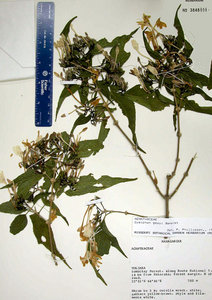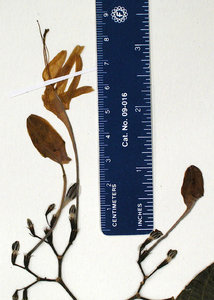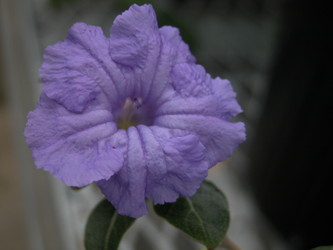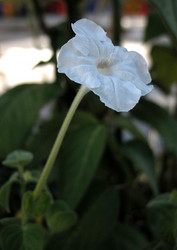African Ruellia
Erin Tripp- Ruellia anaticollis Benoist
- Ruellia ansericollis Benoist
- Ruellia cordata Thunb.
- Ruellia detonsa Benoist
- Ruellia discifolia Oliver
- Ruellia geayi (Benoist) E. Tripp (= Eusiphon geayi Benoist)
- Ruellia insignis Balf.f.
- Ruellia latisepala Benoist
- Ruellia lineari-bracteolata Lindau
- Ruellia malacophylla C. B. Clarke
- Ruellia megachlamys S. Moore
- Ruellia patula Jacq.
Note: this taxon list is still under construction. It does not yet contain all known African Ruellia subgroups.
Only species that were sampled in Tripp's study (in press) are listed.
Introduction
African Ruellia form a grade that is ancestral with respect to New World Ruellia (Tripp, in press). Species that have been sampled and are in this grade are listed above. Members of this group are distributed in Madagascar and across mainland Africa including Botswana, Democratic Repulic of Congo, Ethiopia, Ghana, Kenya, Namibia, Somalia, South Africa, Tanzania, Uganda, Zimbabwe, and other countries. At least one species occurs on an island in the Indian Ocean, i. e., Ruellia insignis Balf.f. on Socotra (Yemen). In Floral of Tropical Africa, Clarke (1900) treated 15 species of Ruellia in Africa. Benoist (1939, 1967) treated another 30 species of Ruellia from Madagascar, most of these non-overlapping with those in Clarke's list. One species native to Ethiopia, Ruellia megachlamys S. Moore, has corolla tubes longer than any known Ruellia, and possibly longer than any acanth (see photo above). The narrow, unexpanded portion of the tube is 13+ cm! Flowers open in the evening and produce a faint, sweet odor (pers. obs), which is very notable within the family as most acanths are odorless.
Included in this African grade is the Malagasy endemic Eusiphon geayi, which was recently transferred to Ruellia. Plants of Ruellia geayi (Benoist) E. Tripp are shrubs with long-tubed white flowers. The calyx lobes are fused for the majority of their length (see photo below). Pollen of Eusiphon matches that of Ruellia, supporting molecular data that indicate the two are closely related.



Herbarium specimens of Ruellia geayi. Images © 2006 Erin Tripp.
Species of Ruellia also occur in other non-African (incl. Malagasy and Soctran species) regions of the Old World. They are distributed on the mainland of southeast Asia, through the Malay Archipelago, and into Australia. These were not included in Tripp's study (in press) due to a lack of herbarium or living material. Little is known about these species, and thus they are deserving of further study.
References
Benoist, R. 1939. Nouvelles Acanthacées Malgaches. P. 144 In: Notulae Systematicae, vol. 8, ed. H. Humbert. Contribution a l'etude de la flore de Madagascar et des Comores. Fasc. 3. Paris.
Benoist, R. 1967. Famille 182 – Acanthacées. In: Flore de Madagascar et des Comores, ed. H. Humbert. Tome I. Mus. Nat. Hist. Nat., Paris.
Clarke, C. B. 1900. Acanthaceae, Vol 5. In: Flora of Tropical Africa (ed. W. T. Thiselton-Dyer). Lovell Reeve & Co., London.
Tripp, E. A. Evolutionary relationships within the species-rich genus Ruellia (Acanthaceae). Systematic Botany, in press.
Title Illustrations

| Scientific Name | Ruellia insignis Balf.f. |
|---|---|
| Specimen Condition | Live Specimen |
| Identified By | Erin A. Tripp |
| Collection | Wild collected in Socotra (Yemen) |
| Copyright |
©
Erin Tripp

|
| Scientific Name | Ruellia megachlamys S. Moore |
|---|---|
| Location | cultivated, DUKE greenhouses |
| Specimen Condition | Live Specimen |
| Identified By | Erin A. Tripp |
| Collection | native to Ethiopia |
| Copyright |
©
Erin Tripp

|
About This Page
Erin Tripp

Rancho Santa Ana Botanic Garden
Correspondence regarding this page should be directed to Erin Tripp at
etripp@rsabg.org
Page copyright © 2007 Erin Tripp
All Rights Reserved.
- First online 13 November 2006
- Content changed 10 April 2007
Citing this page:
Tripp, Erin. 2007. African Ruellia. Version 10 April 2007 (under construction). http://tolweb.org/African_Ruellia/65578/2007.04.10 in The Tree of Life Web Project, http://tolweb.org/










 Go to quick links
Go to quick search
Go to navigation for this section of the ToL site
Go to detailed links for the ToL site
Go to quick links
Go to quick search
Go to navigation for this section of the ToL site
Go to detailed links for the ToL site